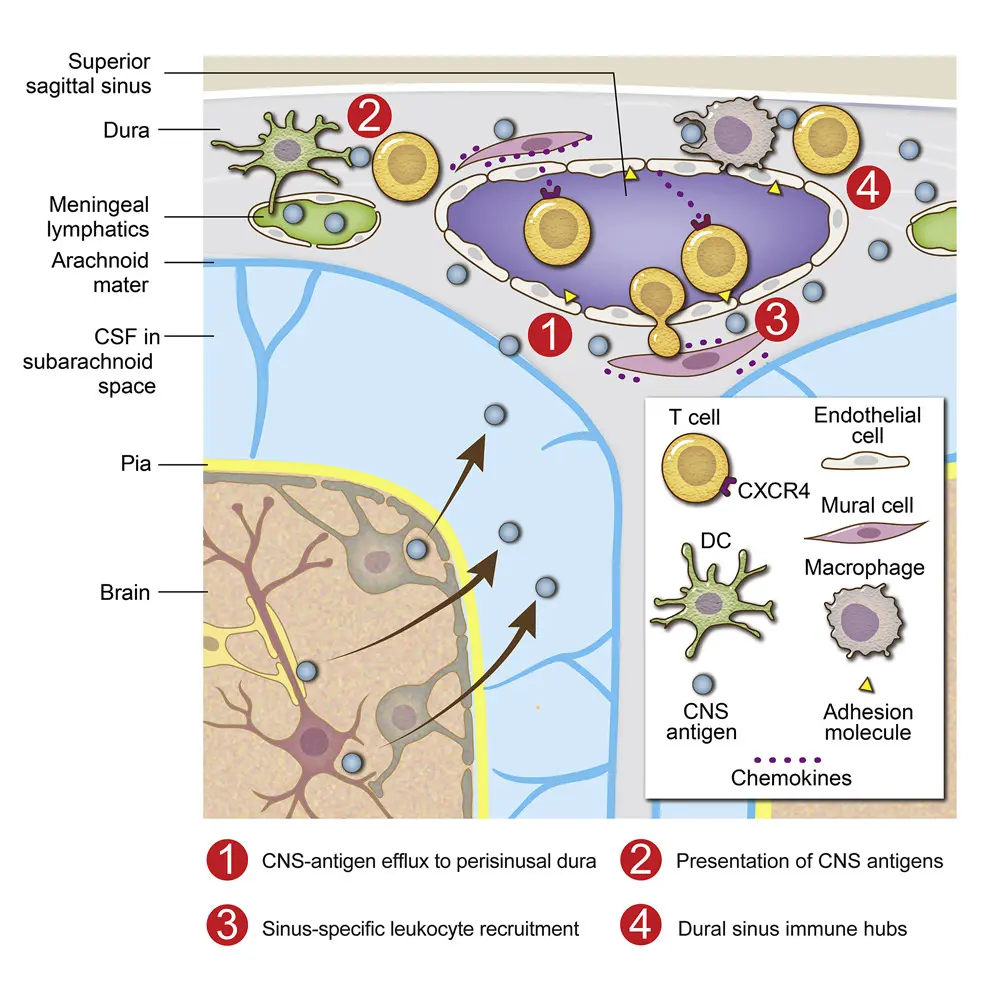How the immune system spies and protects the brain from a distance?
Posted on September 18, 2022 • 3 minutes • 457 words

Immune cells can damage or destroy normal/healthy tissue in the process of fighting infections. This can be affordable in tissues/organs where the cells can regenerate like liver, skin etc. But neurons which make our brain typically have very poor to no regenerating ability. If they die, they die. So, protecting neurons is more crucial than protecting other cells.
Brain was thought to have something called “immune privilege” which allows the tissue to tolerate the introduction of antigens (any substance that causes your immune system to produce antibodies against it) without eliciting an inflammatory immune response. But recent studies in animals have shown evidence that brain and immune system do interact. In fact researchers have observed cognitive deficits in mice that lack immune cells.
Recently a research published in the journal Cell done by Justin Rustenhoven et. al has shown that the immune cells monitors and protects the brain without being in the brain itself. The immune system operates from a distance to avoid damage to brain in the process of protecting it. The immune cells patrol the sidelines (Dural Venous Sinuses) until they detect a threat.
 |
|---|
| Various Dural Sinuses of the Brain - Dr. Johannes Sobotta - Atlas and Text-book of Human Anatomy |
They found that the antigens - foreign bodies like pieces of pathogens were washed from brain and accumulate around the dural sinuses in the channels at the back of the brain that drain the cerebral fluid into the body and are captured by the local immune cells (APCs) and presented to the main patrolling immune cells (T - Cells) in the blood in dural sinuses as they are in close proximity. “Everything’s actually highly concentrated in that particular site,” Rustenhoven said.
 |
|---|
| Graphical abstract of the research article. |
These dural sinuses curving around the back are a hub of immune activity and neuroimmune interface. The researchers found leaks in the arachnoid mater (which was thought impermeable till now) that allowed passage of antigens and other substances. This allowed the immune cells to lauch an immune response when a suspected antigen is detected.
This shows that the brain is not so immune privileged and immune system surveils it but from a distance.
This creates suspicion on whether the diseases like Alzeihmer’s, Multiple Sclerosis and other auto-immune diseases are caused by problems in the brain or some malfunctuions in this neuroimmune interface.
While this research was primarily done on mice, humans also mimic very similarly in terms of the brain structure and immune system. Further research in this direction may reveal new treatment modalities and management protocols for many brain diseases.
By the way, do read Quanta Magazine regularly for really interesting articles.
Please subscribe to my newsletter to get all my interesting articles to your inbox.
Share this article:
Medical Advice Disclaimer: DISCLAIMER: THIS WEBSITE DOES NOT PROVIDE MEDICAL ADVICE The information, including but not limited to, text, graphics, images and other material contained on this website are for informational purposes only. No material on this site is intended to be a substitute for professional medical advice, diagnosis or treatment. Always seek the advice of your physician or other qualified health care provider with any questions you may have regarding a medical condition or treatment and before undertaking a new health care regimen, and never disregard professional medical advice or delay in seeking it because of something you have read on this website.